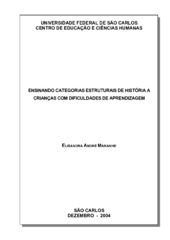Ensinando categorias estruturais de história a crianças com dificuldades de aprendizagem.
Abstract
The development of children s ability of written narrative of stories can be related to previous experiences with oral models, as when adults read or tell stories in schools or in the family context. Teaching abilities of oral narrative of stories can be a way of inducing changes in the oral and written language of children with normal learning as well as those with learning difficulties. This may be specially important for the latter
children because they often show little academic improvement in the classroom. The present study applied two programs to two groups of children with learning difficulties. The first program, applied only for Group 1, had the purpose of providing participants with experience of retelling stories, previously to the second program.
Both groups were exposed to the second program, which attempted to teach participants to identify structural categories of stories (setting, theme, plot, and resolution) in oral narratives. The effects of both programs were evaluated on 1) retelling stories (free retelling and driven retelling), taken as measures of story
comprehension, and 2) oral production of original narratives. In the tasks focusing narrative ability (oral production and free retelling) the structure of the narrative was analyzed, with regard to the presence of the structural categories of stories. The task of driven retelling consisted of answers to questions and these were analyzed
regarding the ability of participants to recover information form the text and make inferences. Although both groups showed improvement in the ability to identify categories, in the tasks of oral production and free retelling, results of Group 1 were superior. Both groups showed only slight improvement in driven retelling. The previous textual experience provided by the first program seems to be a relevant developmental factor explaining the superior performance of Group 1 in the second program.
